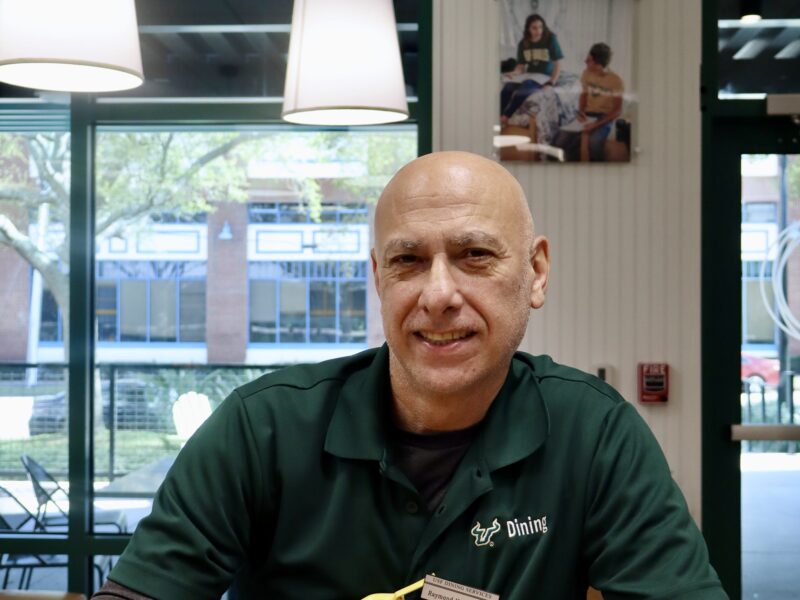Darnell Henderson | The Crow’s Nest
By Catherine Hicks
At the beginning of the semester, Alexendra Davis was planning to use her financial aid refund to save for a new car.

Courtesy of Alexendra Davis
But when one of her third-party scholarships processed late, Davis, a senior mass communications major at USF St. Petersburg, was notified of an overaward and that she now owed $800 to the school.
Davis found herself in one of the various difficulties students face when utilizing financial aid.
“The money from the scholarship should have come as a refund to me, but instead it felt like I was being punished for earning scholarships to pay for college,” Davis said. “I was forced to take out another loan – an unsubsidized loan at this point, where interest is accrued from the get go.”
When Davis inquired as to why the overaward had occurred, she was told she’d “reached her financial aid limit.”
“I don’t know the details, but they take what your (estimated family contribution) is towards your school, and subtract your total (cost of attendance) and that becomes your amount of financial aid,” Davis said. “Despite my dependent tax status, my parents live in Massachusetts and do not pay towards my living expenses or school.
“Everyone (in financial aid) was generally friendly when I was trying to communicate and find information, and though there was not a ton they could do, they did try and make an effort to fix the issue.”
The financial stress of an overaward and subsequent unexpected bill is a commonality for many students. For those who already utilized their available loans or don’t qualify for federal loans, an overaward can force them to pay out-of-pocket.
“Overawards occur any time a student is awarded aid they are ineligible for or that exceeds applicable limits,” said Erin Dunn, director of financial aid and scholarships at USF St. Petersburg.
The most common causes of an overaward are a student’s cost of attendance, which serves as a cap for the total amount of aid a student can receive, availability of unmet need and an equity cap on need-based aid awarded.
“We are required to resolve the overage to ensure the total of all awards do not exceed the cost of attendance,” Dunn said. “We have to return some of the aid already received… the potential for an overaward occurs every time the student awards are adjusted.”
Overawards are not the only obstacles students must navigate in order to get financial aid.
USF has undergone a host of changes recently, including consolidation, which stripped the St. Petersburg and Sarasota-Manatee campuses of their singular accreditation. The COVID-19 pandemic that forced most communications online and cancelled many in-person gatherings has only added to the challenges students face.
One such change that occurred as a result of consolidation was a migration of all USF email accounts from Gmail to Outlook, or Microsoft Office 365, over the week of March 16 to 22. This migration changed all official university communications to the outlook email address, and required students to begin utilizing it.
However, for some students who had grown accustomed to their Gmail account, the email migration caused more problems.
For Allison Kelly, a senior marketing major at the Tampa campus, the email migration inhibited her from making contact with financial aid when she first noticed an issue on her OASIS account.

Patrick Tobin | The Crow’s Nest
Kelly, who had used her Florida prepaid the previous two semesters at USF, expected her payments to post to her OASIS account as it had in previous semesters. This year she watched as the payment due date passed, with no money appearing in her account.
“(I was) initially really freaked out,” Kelly said. “(It) made me very stressed about what was going to happen, and if I’d be able to pay for my classes on time.”
Kelly waited a few days to see if it would post to her account and finally emailed financial aid, unknowingly making a mistake by using her Gmail email account instead of her newly assigned Outlook account.
She then waited a week for a response – which never came. Finally, Kelly realized she’d used her Gmail account instead of the Microsoft account, which she says is “difficult to access from any device.”
“(Using the wrong email) is why they didn’t email me back, they didn’t even reply telling me I had to use my Microsoft account to discuss these matters,” Kelly said. “All my emails are forwarded to my Gmail anyway so it’s not a security measure if you ask me.
“It was truly annoying the lack of communication from them for a whole week and then when I emailed the same email through my Microsoft account they replied within minutes,” Kelly said.“It was a true hassle to get in contact with the financial aid office. Apparently I have used up all of my FLPP, I have yet to verify this though.”
Dunn admitted that the shift to virtual operations has been “very difficult” for financial aid offices attempting to remain in contact with students and parents who have questions about the financial aid process.
“While classes were being adapted to online/remote format, there was some precedent on how to do that,” Dunn said. “However, for many of the administrative offices, there wasn’t that same kind of precedent for adapting remotely. We had to learn how to do things differently between various staff members located across the Tampa Bay Area and other offices, as well as our interaction with students and their families.”
The difficulties also come at the busiest time of the year for financial aid – the start of a new academic school year.
“Our largest call volume is during the summer going into fall…,” Dunn said. “We also start awarding Fall aid in June (also while operating remotely) and that increases questions as well. After some research, the Five 9 remote phone system was identified to forward the office calls to our home computers.”
Five 9 is a call rerouting software that utilizes IP telephone calls and cloud contact center software in order to allow calls placed to financial aid to be received by employees that are working remotely.
Dunn recognizes the difficulty surrounding parent and student’s confusion in financial aid this semester.
“It’s scary enough to send a child off to college, but even more so when the ability to speak with someone in person is prohibited to a pandemic,” Dunn said. “I feel that’s an important part of my job: to help alleviate anxiety and calm those fears, and this year we couldn’t. So, we learned and adapted. We became very proficient in using MS teams for virtual appointments, rather than one-on-one in office appointments.”



